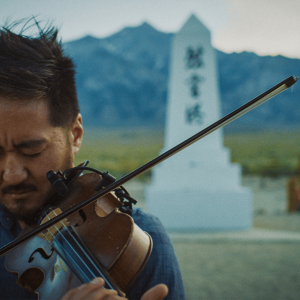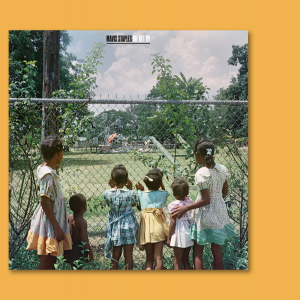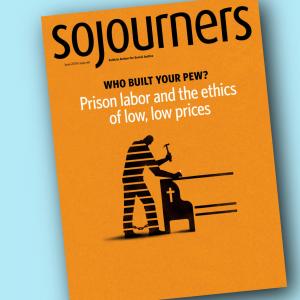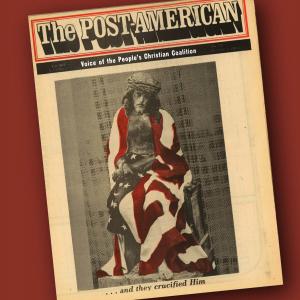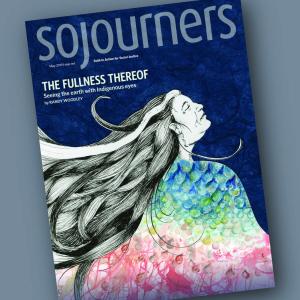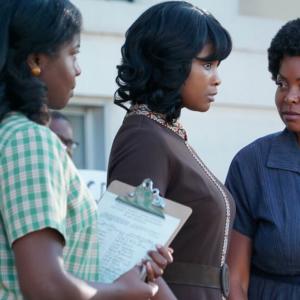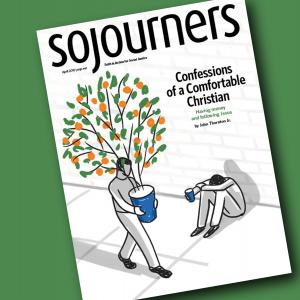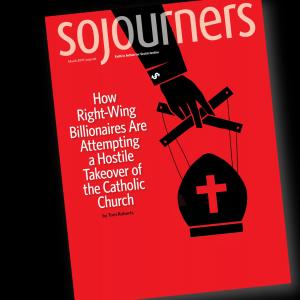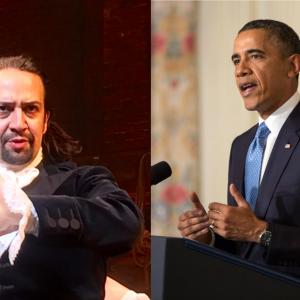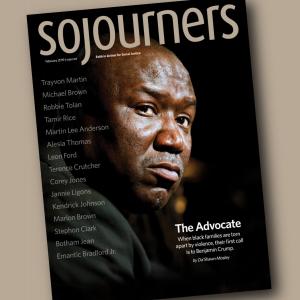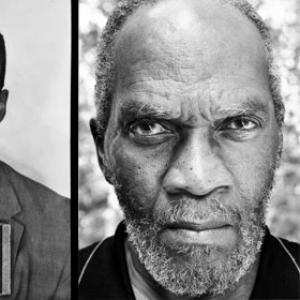Posts By This Author
New & Noteworthy: November 2019
Three culture recommendations from our editors.
Notes on Compassion
In Kishi Bashi’s fourth studio album, Omoiyari, he examines what history can teach us about America today. The forced relocation and internment of more than 117,000 Japanese Americans during World War II is evoked through poignant lyrics that paint parallels between then and now. Joyful Noise
New & Noteworthy: September/October 2019
Three culture recommendations from our editors.
Songs of Courage
Grammy winner and civil rights icon Mavis Staples offers a powerful message of faith and justice in her 17th album, We Get By. Backed by funk rhythm and gospel-inspired vocals, Staples’ textured voice implores listeners to “be brave in a scary world” and “pray sometime” to bring about much-needed change. Anti/Epitaph
Art and State
Be Recorder: Poems is a shockingly personal yet sharply political collection. Carmen Giménez Smith’s fluid free verse offers an urgent reckoning of self and nation. Giménez calls Americans to account for their complicity in upholding a power-and-profit-driven model and forges the path toward a redefined America. Graywolf Press
Crude Faith
Darren Dochuk’s Anointed with Oil: How Christianity and Crude Made Modern America tells how America’s infatuation with oil gave rise to an American exceptionalism deeply embedded in the Christian faith. Dochuk writes that oil, hailed as a blessing from God, has now become an “imprint on America’s soul.” Basic Books
New & Noteworthy: August 2019
Three August culture recommendations from our editors.
Shelter and Storm
Seeking Shelter: A Story of Place, Faith, and Resistance is a 30-minute documentary on the personal history of the late Christian activists Daniel Berrigan, William Stringfellow, and Anthony Towne. Using firsthand accounts, the film follows their work for civil rights, social justice, nuclear disarmament, and environmental action. Seekingshelterblockisland.org
Response: July 2019
“Maybe Just Listen”
In “Remembrance and Repentance” (May 2019), Kimberly Burge wrote about her church, founded by Methodists who had split from their denomination in 1844 “so that its members could defend slavery while remaining within the church.”
New & Noteworthy: July 2019
Three July culture recommendations from our editors.
Among the Branches
Retro sounds meet recent dangers in the album Things That Grow. Backed by Memphis rock musicians, songwriter Tracy Howe sings of liberation from violence, racism, and environmental destruction. Soul and gospel lift her prayerful words and guide listeners forward on the shared “justice road.” Just Love Music
From the Editors: What is the Worth of a Human Life?
It’s not a question we can answer through balance statements and spreadsheets.
IN 2015, Pope Francis told inmates at Philadelphia’s Curran-Fromhold Correctional Facility that the purpose of prison is rehabilitation, “to give you a hand in getting back on the right road, to give you a hand to help you rejoin society.” The pontiff said these words in front of a throne-like walnut chair made for him by prisoners participating in Philacor, a program that, according to news coverage about the pope’s visit, offers job training in carpentry, catering, printing, and textiles to those behind bars.
New & Noteworthy: June 2019
Four June culture recommendations from our editors.
Inextinguishable Spirit
“Black faith still can’t be washed away” Solange sings in her album When I Get Home. The ambient work pays homage to her Houston roots while exploring themes of blackness and spirituality. Synth, syncopated drums, smooth vocals, and experimental time signatures form a liberating fusion of sound. Saint Records/Columbia
From the Archives: Fall 1971
‘I was Hungry and You Blamed It On the Communists’
I was hungry and
you blamed it on the communists
I was hungry and you
circled the moon
Letters: June 2019
Letters to the editors from Sojourners readers.
Lifting the Shadowland of the Devil
After watching news about the New Zealand shootings, I read Jay Wamsted’s article “How Racism Wins” (April 2019) and was struck by how the words of this high school teacher are in the spirit of Father Daniel Berrigan. Then I flipped the page to Rose Marie Berger’s review of The Five Quintets by Micheal O’Siadhail (“Madame Jazz vs. Madame Guillotine”), lifting the shadowland of the devil for a moment with the work of an Irish poet. Thank you, Sojourners.
Kemmer Anderson
Chattanooga, Tennessee
From the Editors: Changing Our Lenses
What is our role, as human beings, to creation?
MAYBE YOU’VE HEARD a land acknowledgement at a conference, sporting event, or worship service. These brief statements name the Indigenous territory on which an event takes place, a small sign of respect to the people who stewarded this land for millennia and whose deep relationship to the land continues today. For any of us who’ve settled on that land, these statements are intentionally unsettling, a way “to counteract the ideologies operating in the Doctrine of Discovery by naming that the land was not empty when Europeans first arrived,” as one group of Canadian churches put it.
But land acknowledgements become trite—an easy checkmark in the social justice box—if they are not part of ongoing relationships with local Indigenous communities. These relationships must include settlers being quiet and listening to some hard truths from Indigenous people about history, responsibility, and reparations.
New & Noteworthy: May 2019
Four May culture recommendations from our editors.
Unity After Division
In the film The Best of Enemies, Oscar-nominated actress Taraji P. Henson portrays Christian civil rights activist Ann Atwater. Atwater and a Ku Klux Klan member are from opposite walks of life, but a school desegregation decree surprisingly places them on the same team. STX Entertainment
Healing Narratives
More than 20 years after its original printing, artist and activist Aurora Levins Morales’ book Medicine Stories: Essays for Radicals is republished with 12 new essays and updates to nine others. Levins Morales shares stories from her social justice-minded life to empower her peers and younger generations. Duke University Press
Letters: May 2019
Letters to the editors from Sojourners readers.
Absentee Church
Thank you so much for Tom Roberts’ “The Rise of the Catholic Right” (March 2019). This article clearly defines the issues and helps place my position in the church. It is increasingly difficult to develop as a Catholic and a Christian when we see the right wing of the church dominate the conversation. When parts of the church are always condemning and never loving, it makes it difficult to articulate the positive, loving message of my church within society. At times, it is not that people have left the church; it is that the church has left the people.
David Pitt
Kilbarchan, Scotland
Hostile Billionaires
According to Vatican II, the Catholic Church is supposed to be the sacramental presence of Jesus Christ in our time and place. Jesus’ ministry was about love, healing, and forgiveness. While Pope Francis is leading the Catholic Church to become the loving, merciful presence of Jesus Christ, the hostile billionaires referenced in “The Rise of the Catholic Right” are [like the religious leaders of his day] Jesus labeled as hypocrites. It is sad that so many of the hierarchy are fellows with the billionaires.
Thomas Spring
Wailuku, Hawaii
From the Editors: On Billionaires and Luxury Pizza
‘We don’t have that kind of money.’
IF YOU PROVIDE 48 hours’ notice and $2,000, Industry Kitchen, a New York City restaurant near Wall Street, will serve you a pizza covered with edible 24-karat gold. In response to an article promising “7 gold-covered foods” that “will break your bank,” Washington Post opinion columnist Elizabeth Bruenig tweeted that “covering good food in expensive garbage” is “for rich people who have so much money they can’t think of anything else to do with it than literally turn it into [excrement].”
We don’t have that kind of money; our idea of fancy food is forking over an extra buck or two for avocado on our sandwich. But though we don’t eat gilded food, we have to confess that we’ve fallen short on following Jesus’ instructions to sell all we have and give to the poor. “I drive a car, go on vacation, and eat at restaurants with friends,” writes John Thornton in “What the Bible Doesn’t Say about Financial Security.” “I have health insurance, a bank account, and a job.” So do we.
New & Noteworthy: April 2019
Four April culture recommendations from our editors.
Jesus on Line One
Afro-Latinx artist duendita’s EP direct line to My Creator confronts faith, doubt, and police violence against women of color in a powerful, prayerful debut. Fusing R&B, jazz, and soul, duendita conveys a striking range of emotion through rich, fluid vocals and ambient instrumentals. duendita.bandcamp.com
Spears into Pruning Hooks
Beating Guns: Hope for People Who Are Weary of Violence offers creative, Christ-centered responses to gun violence. Activist Shane Claiborne and Mennonite pastor-turned-blacksmith Michael Martin engage readers by interspersing the theology, history, and politics of guns with scripture, photos, quotes, and memorials to gun-violence victims. Brazos Press
Letters: April 2019
Letters to the editors from Sojourners readers.
A Powerful Profile
Thank you, Da’Shawn Mosley, for your profile of attorney Benjamin Crump (“The Advocate,” February 2019). You captured his passion and faith-oriented vision for combating the powers of racism and violence through the legal system. I wish you well in telling stories that will bring insight, anguish, hope, and resolve to people seeking to be Jesus followers in this world.
Greg Bowman
Salem, Ohio
Lived Faith
“The Advocate” is an example of how some Christians just chatter about their faith while others go out and live it.
Susan Gunn
Round Rock, Texas
From the Editors: An Unholy Alliance of Money
How to grapple with the rise of the Catholic Right.
“SOJOURNERS IS MY favorite Catholic magazine,” readers occasionally tell us. Even though we’re an ecumenical Christian magazine with evangelical-ish roots, the compliment always makes us blush with pride. As we see it, if these pages resonate with Catholics, mainline Protestants, and evangelicals alike (as well as folks from Pentecostal, Orthodox, and other traditions), we must be doing something right.
In this interdenominational spirit, we publish “The Rise of the Catholic Right,” by Tom Roberts, executive editor of National Catholic Reporter. Through careful investigative work, Roberts offers an in-depth look at how private—and wealthy—conservative Catholic organizations are using money to exert undue influence in achieving their right-wing political and theological agendas.
New & Noteworthy: March 2019
Four March culture recommendations from our editors.
Let the Beat Drop
Hamildrops, a series of 12 singles inspired by Hamilton, includes a range of artists (Black Thought, The Regrettes, Sara Bareilles) singing or rapping on topics such as racism, domestic abuse, and recovery efforts in Puerto Rico. The last released song features gospel legend BeBe Winans and Barack Obama. Hamildrops.com
Tackling Health Disparities
How Neighborhoods Make Us Sick: Restoring Health and Wellness to Our Communities offers an innovative, Christ-centered vision for approaching health disparities in inner cities. Drawing on professional experience in community development and public health, Veronica Squires and Breanna Lathrop outline achievable goals for promoting health equity. InterVarsity Press
Letters: March 2019
Letters to the editors from Sojourners readers.
Spiritual Immaturity
Our current technology is one of the most powerful and amazing gifts our civilization has. “Big Tech” enables deaf people to communicate via sign language over visual phones. “Big Tech” enables patients to remotely control electrostimulation implants, to control chronic pain without narcotics. For me, “Big Tech” has fulfilled a decades-long dream of sharing my awe at God’s majesty in nature via photos to viewers all over the world. How we use our technology equates to the level of spiritual maturity in our civilization. The abuses Gaymon Bennett appropriately cites in his article “Silicon Valley’s Original Sin” (January 2019) are symptoms of spiritual immaturity that are burdening our civilization. For our civilization to survive, we must begin to awaken awe, wonder, and spiritual awareness in our daily lives.
Stephen Eric Levine
Garland, Texas
Too Little, Too Late
I found Danny Duncan Collum’s castigation of Paul Simon in his article “Graceless in ‘Graceland’” (January 2019) to be somewhat self-righteous. For Collum to criticize Simon for working with native musical artists such as Ladysmith Black Mambazo, contrary to a political boycott, seems to imply that Simon and Ladysmith Black Mambazo were supporters of apartheid. “Graceland” came out over 30 years ago, and Collum’s article is too little, too late.
David E. Dax
Lexington, Virginia
From the Editors: The Church’s Problem With Sensuality
Blame it on the apple, Augustine, or purity culture, but many churches blush when it comes to body parts, especially naked ones.
“IT'S HARD TO imagine the average evangelical church embracing Mutesa’s colorful portraits of nude black joy,” writes Faith-Marie Zamblé in her profile of the young photographer whose work is rippled with laughter, face paint, and bare skin. Though the mood of Mimi Mutesa’s work is more exuberant than explicit, Zamblé is right: Blame it on the apple, Augustine, or purity culture, but many churches we know—evangelical or otherwise—blush when it comes to body parts, especially naked ones. Ever notice how crucifixes often have Jesus wearing a loincloth despite scripture’s insistence he was stripped?
We suspect Christian jitters around nudity are rooted in fear that naked bodies will arouse unholy sexual thoughts. But as Lutheran pastor Nadia Bolz-Weber points out, the church’s tendency to couple sexuality and sin has led to a sense of shame that many Christians find hard to shake. “I wonder how we could begin to honor sexual pleasure as something that can connect us more deeply to ourselves and others and God, yet still speak the truth about the ways in which our behaviors around sex can also do the opposite,” she writes in “Honor Thy Sexual Pleasure?” an excerpt from her forthcoming book, Shameless: A Sexual Reformation.
New & Noteworthy: February 2019
Four February culture recommendations from our editors.
Freedom Ride
The expanded edition of Breach of Peace: Portraits of the 1961 Mississippi Freedom Riders revisits a pivotal civil rights campaign. Filled with mugshots and recent interviews of several riders who were arrested in Jackson, Miss., Breach of Peace honors a historic act of protest. Vanderbilt University Press
One Body, Many Parts
Together at the Table: Diversity Without Division in the United Methodist Church, by Bishop Karen P. Oliveto, the UMC’s first openly LGBTQ bishop, is timely as the denomination nears a potential split over sexuality. Oliveto outlines how her denomination can remain whole. Westminster John Knox Press
